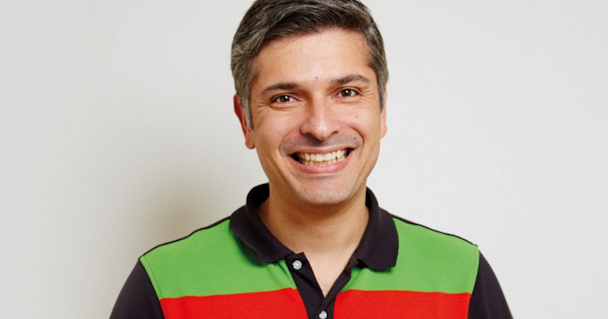Burger King CMO on creative pressure: ‘Every year I think, how do we do it again?’
In order to find the world's top marketer, The World Federation of Advertisers (WFA) has once again partnered with The Drum for the Global Marketer of the Year award. Here we interview nominee Fernando Machado, chief marketing officer at Burger King.

Burger King CMO Fernando Machado has been nominated for WFA Global Marketer of the Year
Last June, Burger King’s ‘Whopper Detour’ campaign won three Grand Prix awards at the Cannes Lions Festival. Three months later, that same campaign won the brand two Grand Clio trophies. Now, Fernando Machado, global chief marketing officer for Burger King, has to figure out how to do it all over again.
“It's only downhill,” he jokes. “We push like hell on the creative ambition to get some really cool stuff, but every year we look at ourselves and think, how do we do it? How do we do it again? It's exciting and frightening at the same time.”
Machado is on the shortlist for the World Federation of Advertisers Global Marketer of the Year for 2019, alongside top marketers from P&G, L’Oreal and Grab among others.
His nomination for the accolade came after Burger King rolled out some eye-catching work (though not always for the right reasons) last year, such as the ‘Burn That Ad’ and ‘Whopper Secret’ campaigns. But Popeyes, which along with Burger King and Tim Hortons sits under the Restaurant Brands International (RBI) umbrella, only needed a single tweet to grab everyone’s attention.
What started as a playful Twitter spat with rival brand Chick-fil-A, Popeyes turned a tweet about its new chicken sandwich into an estimated earned media value of $23.5m over just 11 days.
“If you ask me, in my 25 years, what was the closest thing that I've seen to the Popeyes chicken sandwich? There was nothing,” Machado says.
The Brazilian has spent the last six years at Burger King after a near-11 year stint at Unilever, where he last worked on the Dove brand. Machado says he called Burger King looking for a job, not the other way around, after deciding he wanted to develop the same kind of creative work he grew up enjoying from the fast food brand.
While he’s still “super hands-on,” Machado now acts as the “single point of accountability” for marketing across the RBI portfolio, though he continues to take the lead on Burger King's advertising efforts.
Machado isn’t looking for a successor at the Home of the Whopper yet, but he realizes that “in the long run I probably need to have” a chief marketer at Burger King, Popeyes and Tim Hortons.
But for now, the man who’s been called a “brand genius” and “the most-loved CMO in advertising,” is trying to figure out how to reach consumers who are growing increasingly averse to ads. Even Machado admits he “hardly ever” watches ad-supported TV, and when does he’s likely fast-forwarding through the commercials with his DVR.
“If you create something that looks, feels and smells like an ad, it's probably not a good ad,” says Machado. “I'm trying to engage people. I'm trying to do something that [gets people] to laugh, smile, share… and pay attention.”
He adds that there is “still room for more of like tactical, promo-type” TV campaigns for all brands in the competitive fast food space. Campaigns for RBI’s brands will have a multimedia approach, but Machado says investment in digital channels will increase.
Digital marketing spend for Burger King is as high as 30% in Brazil and China, compared to a global average of around 10% to 15%, Machado says.
He has his sights set higher than launching the next great ad campaign though. Machado says 2020 is all about focusing on sustainability.
“I would say that five-to-six years ago, we would not talk much about sustainability around here,” he says. “Today, I would say that one-third to half of my team, plus a good dose of investment, is going behind structuring our sustainability plan.”
In the UK, this has seen Burger King already begin to remove plastic toys from its kid’s meals through ‘Project Meltdown’.
“I'm honestly a little bit tired of the same brands doing stunts to create awareness about something,” says Machado. “I want to see brands and companies doing things that cause an impact. I want you to see real things happening that cause an impact on the real world for the real consumers. That's why I like ‘Project Meltdown’ so much.”
There’s no denying the need to adopt sustainable business practices, but even one of the industry’s most well-established marketers isn’t immune to the short-term pressures of the position.
“One of the key challenges any CMO has these days is how to balance the short-term and the long-term. Because you have a push from your CFO, from the CEO, from stakeholders, from the board to deliver the short-term results, especially in competitive categories,” Machado says.
“But as a CMO, you need to strike that balance. You need to also push the company to start thinking or doing things that will help you strengthen the band for the long-term.”
Machado is also putting a lot of investment behind Burger King’s tech, such as making payments through its mobile app, rolling out more digital in-store menu boards, and integrating with more food delivery apps.
“If I make an improvement on a product in any of these fronts, my sales are not going to increase tomorrow. But, if I don't start working on this now, my brand and my products will not be fulfilling consumer needs five, 10 years from now. And that's the balance I'm looking for,” says Machado.
You can vote for Machado, or the other finalists for the WFA Marketer of the Year Award, here.
